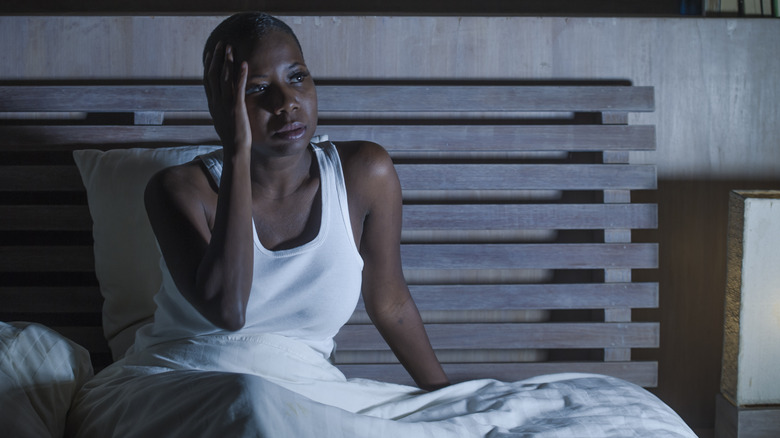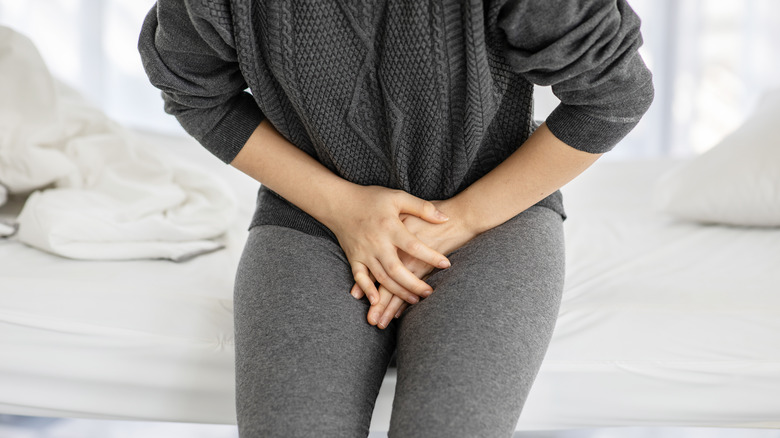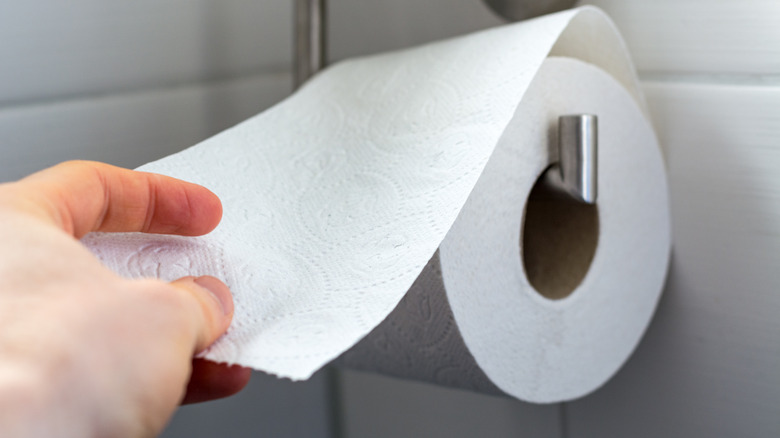Avoid This Poop Mistake If You Don't Want To Wake Up To Pee All Night
Urination and defecation ultimately support the same goal: ridding the body of waste. While our urinary tract and our digestive tract achieve this in different ways, bowel movement habits can influence urinary habits. This is particularly true for those who experience constipation.
According to the National Institute of Diabetes and Digestive and Kidney Diseases, a person is considered constipated if they are pooping less than three times a week. When they do actually go, the stool is usually a dry, hard consistency. Rather than passing stool with ease, constipation can make pooping painful and often results in straining during a bowel movement. It's this straining that can increase one's risk for nocturia, otherwise known as frequent nighttime urination (via The Journal of Urology).
So what's considered frequent? Cleveland Clinic experts explain that most middle-aged people urinate once or twice nightly. As we grow older and reach out 80s, it's not uncommon to find ourselves peeing two to three times each night. Anything beyond that, however, may be indicative of nocturia. Here's how you can avoid this common poop mistake and minimize straining when going number two.
Why constipation can cause you to pee more at night
In a 2012 study published in The Journal of Urology, researchers examined the relationship between men's bowel movement habits and the prevalence of urinary symptoms, such as urinary hesitancy, feelings of not having fully emptied the bladder, and frequent nighttime urination. The study findings showed that men who pooped three times or less each week (aka constipation) were more susceptible to nocturia, which the researchers characterized as waking up for two or more bathroom trips nightly.
Different theories have been proposed as to why constipation-related straining may have us peeing more throughout the night. However the subject has been explored more extensively in kids, as many children tend to voluntarily hold their poop. Pediatric experts at the University of California, San Francisco Department of Urology state that our bladder gets subjected to excess pressure when there's a buildup of stool hanging out in the colon. As a result, children may be more likely to wet the bed at night.
Researchers have also suggested that clenching the anal sphincter for long periods of time may cause inappropriate contractions of the pelvic floor muscles as well as detrusor-sphincter dyssynergia. Detrusor-sphincter dyssynergia is a urinary condition that has been associated with nocturia.
Tips to reduce straining during bowel movements
Proper body positioning on the toilet can help us avoid the common mistake of straining during defecation. According to experts at HealthyWA, you want to be sitting up with your back straight while leaning forward at a slight angle. Situate your elbows on your knees, and keep your knees above your hips. Placing a footstool underneath you, or rising up onto your toes, can help with this. Push your stomach muscles forward to help widen the waist and repeat as needed to pass stool. Refrain from holding your breath and breathe out of your mouth. Afterwards, activate your anorectal muscles, otherwise known as the anal sphincter, by pulling upwards to help close the bowels.
Alternatively, if constipation is what has you straining when going number two — and your bladder has been keeping you up at night — talk to your doctor. Try minimizing your caffeine intake and aim to stay hydrated by drinking eight glasses of water every day. Eating soluble fiber-rich foods, like whole wheat pasta or brown rice, may also help ease constipation. The same may be true for pear, prune, or apple juices.


